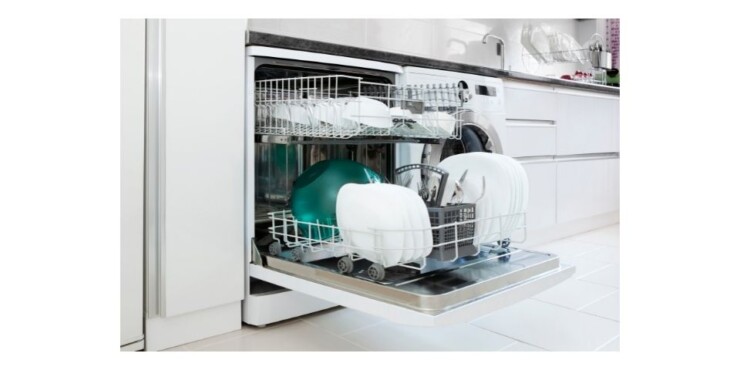Dishwashers are great for anyone with a household that has a lot of dishes to clean at home. They will save you time, money, and most importantly your back if you need to “wash up” the dishes by yourself. Dishwashers are wonderful additions to any home whether they were built at the time of the house or an addition added later.
Dishwashers have many different settings to suit your needs. These settings range from easily cleaning off plates from a dinner party to intensive settings for cleaning in between customers in a restaurant. But do they really use less water compared to hands? In this article, I am going to answer that.
Do Dishwashers Use Less Water?
Dishwashers use less water than washing dishes by hand. However, just how much water they save depends on the number of people in your household and your dishwasher’s efficiency rating.
If you only have one person in your home, you’ll probably use less water by hand washing dishes because you won’t need to run the dishwasher as often. If you have more than one person in the house, however, a dishwasher can save a lot of water.
The amount of water used varies widely depending on the type of dishwasher and its energy efficiency rating. A newer model with an Energy Star rating uses 5-10 gallons per load; older models might use as much as 15-20 gallons per load or more.
Some newer models claim to use less than eight gallons per load but that’s not always true if you include the amount of water required for rinsing off food particles before putting them into the dishwasher in addition to washing them out with soap and hot water afterward.
If you have an older model without an Energy Star rating and don’t rinse off food particles before putting them into the dishwasher, expect to use about 15 gallons per load or more depending on how dirty your dishes are at any given time. The newer models that claim to use less

What Uses Less Water Dishwasher or by Hand?
According to research washing dishes by hand can use as much as 26 gallons of water per load whereas a really efficient dishwasher can use 3-8 gallons.
So, if you are looking for an environmentally friendly way to wash your dishes, it might be worth considering getting a new dishwasher.
However, hand-washing is better for the environment in other ways: It reduces energy consumption. Most dishwashers use electricity to heat the water and energy is used to run the motor and pump. In contrast, hand-washing uses no electricity and therefore generates no emissions.
It preserves natural resources like oil and gas that would be needed to produce electricity for a dishwasher. Hand-washed dishes are less likely to break than those cleaned in a dishwasher because they are dried out properly by hand so there is less chance of them cracking or chipping when put away after cleaning.
How do Dishwashers use so little water?
Dishwashers don’t actually fill up and are watertight. Instead, they use wash cycles that use only a small amount of water.
This is because the water isn’t used directly to clean the dishes. It is used to heat the air in the dishwasher chamber and the hot air will evaporate moisture from your dishes.
Dishwashers use less than 5 gallons of water per cycle on average (depending on how many people live in your home), which is significantly less than hand-washing dishes by hand.
Dishwasher Disadvantages
Dishwashers are a great appliance for your home. They can save you time and energy, and they help keep your dishes clean and sanitary. However, there are some disadvantages to using a dishwasher that you should be aware of before buying one and the two most common cons include:
1. Use a lot of electricity
Dishwashers use more electricity than handwashing dishes by hand. In fact, they use up to three times as much electricity as washing by hand (though the difference depends on how full the dishwasher is). This is because most dishwashers run on 240-volt circuits, which is more power than most homes’ 120-volt circuits can handle.
As a result, many people who have 220-volt appliances in their homes still need an electrician to install an additional circuit just for their dishwasher or other large appliance.
2. Maintenance and repairs
You’ll also have to maintain your dishwasher regularly to keep it running well and prevent damage from occurring. You’ll need to clean out food particles from the spray arms every few months or so and keep them free of debris so that water flows freely through them into the tub; this helps prevent food particles from being deposited on dishes during washing cycles. You’ll also have to

